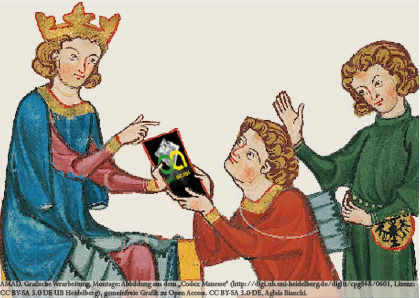AMAD
"Archivum Medii Aevi Digitale - Specialized open access repository for research in the middle ages"To submission

| Date: | 2020 |
| Title: | Informatio et veritas |
| Author: | Bergmann, Eileen |
| Publisher: | Mittelalter |
| Citation: | Eileen Bergmann, Informatio et veritas. Die Informationspolitik des venezianischen Consiglio dei Dieci am Beispiel der da Carrara-Verschwörung (1405-1406), in: Informationsverarbeitung in der Stadt des 12.–16. Jahrhunderts. Beiträge des interdisziplinären (Post-)Doc-Workshop des Trierer Zentrums für Mediävistik im November 2018, hrsg. von Eric Burkart und Vincenz Schwab (Mittelalter. Interdisziplinäre Forschung und Rezeptionsgeschichte, Beihefte 2), S. 37–55, DOI: https://doi.org/10.26012/mittelalter-24425. |
| Series/Report no.: | Mittelalter. Interdisziplinäre Forschung und Rezeptionsgeschichte, Beihefte;2 |
| Abstract: | Der vorliegende Beitrag beschäftigt sich mit der Informationspolitik des venezianischen ‚Consiglio dei Dieci‘ (Rat der Zehn), der sich im 15. Jahrhundert zum politisch einflussreichsten Verfassungsorgan der Seerepublik entwickelt hatte. Zentrale Aufgabe der ‚Dieci‘ war die Gewährleistung städtischer Sicherheit im Angesicht von inneren wie äußeren Bedrohungen. Zu diesem Zweck sammelten die Ratsmitglieder systematisch Informationen, werteten diese aus und gaben sie punktuell weiter. Notiert wurde das ratsinterne Wissen in Form von Registereinträgen in den ‚Deliberazioni miste‘, den Ratsregistern, die seit der Gründung des Gremiums im Jahr 1310 sukzessive geführt wurden. Rekonstruieren lässt sich anhand der Einträge u.a. die Auseinandersetzung zwischen Franciscus da Carrara, dem einstigen Herrscher Paduas, und den Venezianern. This paper examines the arcane logics of the security-related acquisition and management of information in early 15th-century Italy using the example of the Venetian ‘Consiglio dei Dieci’ (Council of Ten). In this period, the ‘Dieci’ had established themselves as one of the most influential political bodies in the maritime republic, whose central task was to guarantee domestic security. The Council governed by systematically collecting, processing, evaluating, and filtering information, as well as by disseminating specific information. The collected data was codified within the ‘Deliberazioni miste’, the Council’s records, which were kept with increasing coverage and complexity since the formation of the Council in 1310. Using the conflict between the Republic of Venice and Franciscus da Carrara, the former Lord of Padua, as a case study the paper examines how the Council responded to a direct threat. |
| URI: | https://www.doi.org/10.26012/mittelalter-24425 |
| Other Identifier: | http://mittelalter.hypotheses.org/24425 |
| License: | CC BY-SA 3.0 Unported |
| AMAD ID: | 24425 |
| Appears in Collections: | General history of Europe Mittelalter. Interdisziplinäre Forschung und Rezeptionsgeschichte Open Access |

